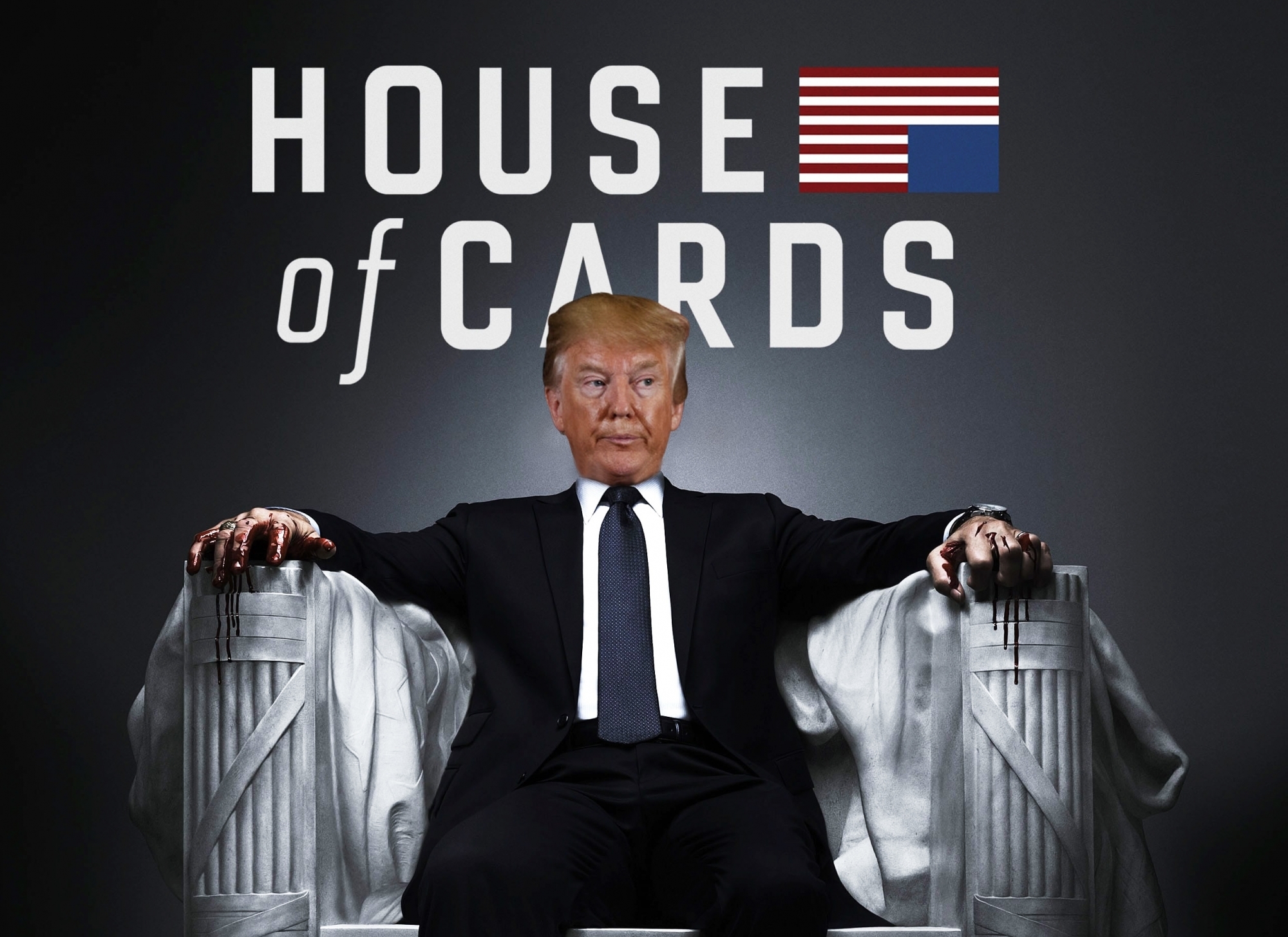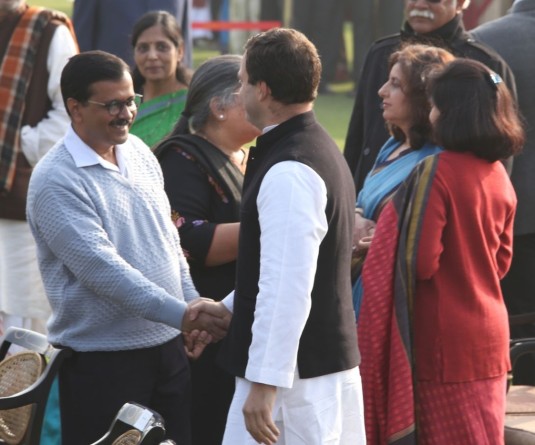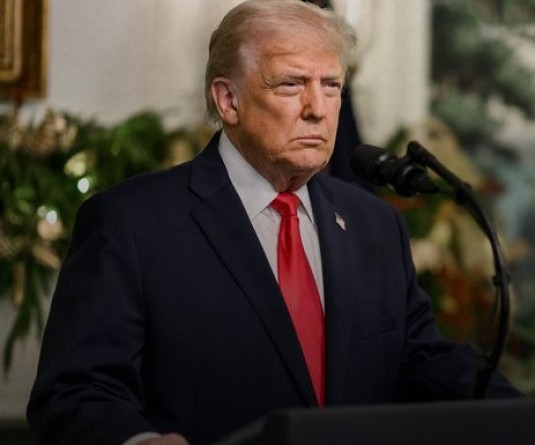The spectre of impeached Trump re-elected is very troubling: Edward Luce

Nikhila Natarajan
New York, November 16 (IANS) It is only the first week of the impeachment inquiry against Donald Trump and it has already been brutal for the US President.
Three career diplomats who have served for decades under both Republican and Democratic presidents have provided chilling detail of the Trump administration's pressure campaigns, "irregular channels", threats and retaliation coming straight from the US President's bully pulpit.
If Trump sat out on Day One saying he was too busy to watch the "boring" testimonies, he couldn't keep himself away any longer, tearing into the third witness, on Twitter, citing "freedom of speech".
Legal experts and investigators are calling Trump's attacks "witness intimidation" and a "crime in plain sight".
The impeachment inquiry against Trump centres around his conditioning crucial military aid to Ukraine on that country's opening an investigation against his political rival Joe Biden's family.
It's too early to say if the inquiry's public phase will shift public opinion, says Edward Luce, US national editor at Financial Times. The most "troubling" thing, Luce says, is the "spectre of an impeached Trump being re-elected".
"My concern is that there's going to be an overreach on the part of the liberal base that will make it easier for Trump to be re-elected."
Trump, Luce says, is most vulnerable on the economics and feels "on much stronger ground" when he is forced to play identity politics.
IANS caught up with Edward Luce to discuss the key takeaways from the newly begun public phase of the impeachment inquiry for the bigger battle looming ahead: the US 2020 elections.
Highlights from the conversation are below:
IANS: We heard the historian Jon Meacham say that if a US president gets away with an impeachable offence he will be doing it with the people, not against. In that context, what's your reaction to what you saw as the impeachment inquiry hit national television?
Luce: It's still too early. The whole game is about whether it shifts public opinion and whether it alerts more Americans to the alleged crimes that Trump solicited. It's certainly clear that there is not going to be any wavering amongst Republicans in the House. The game is going to be whether you get a small coterie in the Senate when it goes to trial e around Mitt Romney and others. And I guess the direction of public opinion will help decide how large that coterie is.
IANS: We almost seem to know how this is going to end and yet we are watching. In the political realm, what lies beyond, assuming that impeachment is dead on arrival in the Senate.
Luce: Beyond that, if it is indeed a sort of slam dunk in the Senate, it is the degree to which amnesia sets in and amongst the electorate, boredom with the whole topic. And B, a sense of impunity on Trump's part that if he can get away with being impeached, he can get away with anything. And, if he can use impeachment or the trial to his advantage by having it stretch through January and February and therefore enveloping the caucus in Iowa, the primary in New Hampshire and beyond, that would be an added advantage to him. Further beyond that, the spectre of an impeached Trump being re-elected is pretty troubling. As I said, that sense of impunity, the guardrails don't work. Look, they did the worst they could do to me, and nothing happened. Nothing can stop me.
IANS: You say liberal dogmatism presents a quandary for the exhausted majority, who do not belong to either cultural camp. Set the scene for us.
Luce: Well you've obviously got a very increasingly ethno nationalist nativist base behind Trump. Maybe that's a quarter of the electorate, and you've got a strong emphasis amongst the liberal grassroots in the Democratic primaries on a stronger identity political response to white ethno nationalism. I describe that as woke multiculturalism. I suspect that the two will feed off each other. I'm certainly not posing a moral equivalence between them but just in terms of the political practicalities of getting to that portion of the electorate that don't subscribe to either fully. You're then going to get a sort of theological situation where there's going to be a lot of agnostics around, who are not going to feel particularly welcome if they don't fully subscribe to either of those theologies. My concern is that there's going to be an overreach on the part of the liberal base that will make it easier for Trump to be re-elected.
IANS: Given his (Trump's) popularity among working class whites and the emphasis that he and his campaign are placing on their vote, where does that leave the Opposition?
Luce: Well, I think the strong emphasis on what all Americans have in common. Whether you're black or white, whatever your sexual orientation, you find that the cost of higher education is crippling. You don't see a rosy future for your children or your nieces or nephews, or your neighbour's children. I think that what binds Americans is a much stronger position for the left to be taking and what they need to be emphasising e and these are not mutually exclusive. It's a far more devastating critique of the pluto populist agenda that Trump has been following. You remember he campaigned on the basis of the forgotten blue collar American, but in practice he's going by textbook Reaganite economic agenda of tax cuts disproportionately to the wealthy and really no public investment in education, infrastructure, or beyond and so he's most vulnerable on the economics. If you get him onto identity politics, he feels on a stronger ground.
IANS: Do you see the impeachment inquiry playing into any of these themes?
Luce: If you remember, it was only six weeks ago, that this really blew up in September when knowledge of the whistleblower complaint was brought to light, and an extraordinary amount has happened since. There has been a very significant bunch of officials, some of them serving officials from the State Department and the White House have come forward to corroborate the whistleblower complaint. You've had all kinds of defences of Trump abandoned by the Republican party as new evidence comes to light wave by wave. So what happens in the next six weeks could be equally dynamic. So, you know, we're all expecting impeachment and acquittal. I'm pretty sure there's going to be an impeachment. In the odds markets, the bookies are putting a 20% chance of conviction and that's non-trivial. There could be could be something that happens beyond the mythical shooting somebody on Fifth Avenue, that brings enough of the Never Trumper Republicans into a critical mass.
IANS: The phrase public opinion is all over. It's awfully hard to move public opinion in a media environment that is so starkly different than during Watergate and the Clinton era. People are slaves of habit, when it comes to news consumption.
Luce: Public opinion has already shifted quite quite markedly in September. It shifted within about 10 days. From the late 30s about 40 per cent favouring impeachment to roughly 50 per cent. That's a pretty big leap. Nowhere near that percentage ever supported the impeachment of Clinton. In fact, the support for Clinton's impeachment dropped as it went on. So, if you can move at 10 percentage points at the outset, another sort of equivalent revelation, or development could potentially shift it further in either direction. So, you're right, it's hard to get through people's viewing experiences which are very habitual and privatised. And you don't live in Walter Cronkite America and you don't probably get most people watching the live proceedings and they're only going to be served up takes on the proceedings that suit the agenda of whoever they're subscribing to. It's more difficult (to shift public opinion) but it's not impossible. You know, the hypothetical of what it is that could lead to a further leak in support for impeachment is very difficult to predict but not inconceivable.
IANS: Closing thoughts?
Luce: You know, what's most significant wasn't actually Day One of the impeachment hearing, it was Trump's meeting in the White House with Turkey's president, in which he capitulated to pretty much every single thing Erdogan wanted. At a time of deeply embedded partisan politics in Washington, you've got complete consensus across both parties and both chambers on Capitol Hill that Turkey should be subjected to sanctions both for excesses in the Kurdish areas of Syria, but also for buying Russian S400 systems. Trump wouldn't be able to veto this bill if the Senate passes it. If Mitch McConnell put it to the Senate, it would pass overwhelmingly. So, you know, if we're thinking through the one area where he could lose his party and you could get a critical mass of Republicans saying look, enough, let's get Pence, it's on the foreign policy side. So, I think we shouldn't take our eye off that ball.






